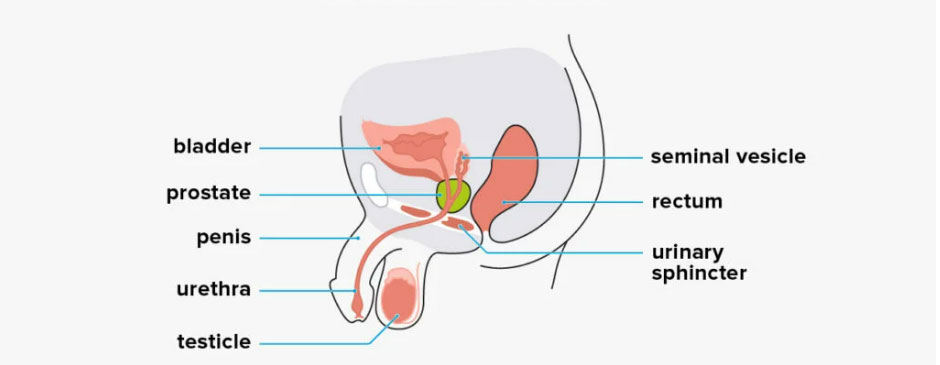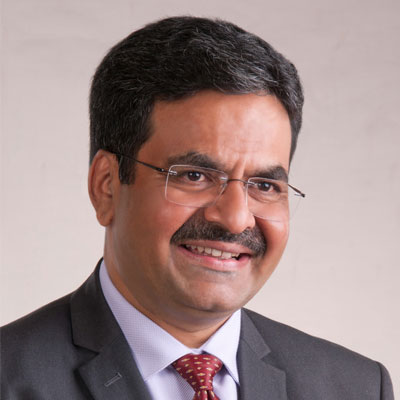The frequent urge to urinate, disturbed sleep due to multiple bathroom visits at night, or experiencing discomfort during urination—blood in urine or semen, pain or burning urination, painful ejaculation, frequent pain or stiffness in the lower back, hips, pelvic or rectal area, or upper thighs—are all signs that may point towards an enlarged prostate. If you can relate to these symptoms, you've come to the right place.
Here’s a story about Martin. He is from Uganda in Africa. For the last six months, he was having a problem with an enlarged prostate and urinary problems.
Gratitude and Hope: Martin's Journey Towards a Better Future
In the heart of Vadodara, Dr. Ashit Shah, a compassionate and skilled urologist, encountered a patient whose journey would leave a lasting impact on both their lives. This patient's name was Martin, a resident of Uganda, Africa, whose world had been engulfed in a relentless battle against urinary problems for six long years.
Martin's struggle began when he was diagnosed with a significant enlargement of his prostate. Seeking a solution, he underwent an endoscopic operation in Uganda, hoping for relief. However, his hopes were shattered as the operation failed to address his persistent symptoms. Frustration and disappointment gripped Martin's heart as he embarked on a quest to find a cure.
Desperate for a glimmer of hope, Martin sought the expertise of several urologists, only to be met with the recommendation for an open surgical procedure. This prospect left him disheartened, as the thought of invasive surgery filled him with anxiety and uncertainty.
Amidst his search for alternative solutions, Martin's path crossed with the tale of another patient who had found solace at Aashray, a renowned medical center in India. Intrigued and eager to explore new possibilities, Martin made a life-changing decision to travel thousands of miles to Vadodara, seeking the expertise of Dr. Ashit Shah.
From the moment Martin stepped into Dr. Shah's office, a sense of compassion and understanding enveloped the room. Dr. Shah carefully listened to Martin's story, examined his medical history, and conducted thorough investigations. With genuine empathy, Dr. Shah assured Martin that open surgery was not necessary, and that a minimally invasive endoscopic surgery would effectively address his urinary problems.
Reassured and filled with newfound hope, Martin returned to Uganda, patiently awaiting the day of his surgery. Three months later, he embarked on the journey back to Vadodara, ready to undergo the transformative endoscopic surgery for his prostate.
Under the skilled hands of Dr. Ashit Shah, the surgery was performed successfully.
As Martin awakened from the anesthesia, a sense of relief washed over him. His urinary problems, which had plagued him for six arduous years, had finally been resolved. Days turned into weeks, and with each passing day, Martin experienced a newfound sense of normalcy.
The catheter was removed, and as Martin stepped into the world, he marveled at the simple joy of urinating normally. It was a moment he thought he would never experience again.
Martin added, “I don’t remember when did I last urinate so normally.”
Gratitude overflowed from Martin's heart as he expressed his heartfelt appreciation to Dr. Ashit Shah and the entire medical team. Their expertise, compassion, and dedication had transformed his life in ways he could never have imagined.
Martin left Vadodara with a renewed sense of hope, eager to share his story with others who may be seeking a solution to their own prostate problems
In the bustling city of Vadodara, Dr. Ashit Shah continues to touch lives, one patient at a time.
Martin's journey serves as a testament to the power of medical expertise, compassion, and the willingness to go the extra mile to provide the best care possible. Together, they have overcome boundaries and brought hope to those who have traveled from afar in search of a better tomorrow.
In the words of Martin,
“My name is Martin. I'm from Africa, in Uganda. I have a problem. I had been suffering from prostate problems for a long time—six years. I'm suffering so much that I was trying to go to the hospital that is there in my country, Uganda, but I was not sure. This time, I came here. I've got a good doctor here. They're giving me treatment where they do surgery. Now I'm feeling well. Thank you, doctor, for this Hospital. They are doing everything to take care of you. I got ample care here. I'm happy to go back to my country. Thank you, thank you very much.”
If you're an older man, someone dealing with bladder stones, recurrent urinary tract infections (UTIs) related to prostatic enlargement, or an individual who has experienced failed medical therapy, this write-up by Dr. Ashit Shah will definitely address your concerns and offer guidance.
Martin's positive experience highlights the importance of seeking appropriate medical care for prostatic enlargement. Now, let's delve into the details and gain a better understanding of this condition.
What is a Prostate?
The prostate is a small gland located below the bladder in men. Its primary function is to produce seminal fluid, which nourishes and transports sperm during ejaculation.

It is a myth among patients that the prostate is always cancerous. There are common prostate problems that are not cancerous. In fact, there are several non-cancerous conditions that can affect the prostate gland. Let's explore some common examples and their respective treatments:
Examples Of Non-Cancerous Prostates And Their Treatments:
-
Benign Prostatic Hyperplasia (BPH):
Benign prostatic hyperplasia, commonly known as BPH, is highly prevalent among older men. It refers to the enlargement of the prostate gland without the presence of cancer cells. Treatment options for BPH include:
- Watchful waiting or active surveillance: If your symptoms are mild, your doctor may recommend monitoring the condition to assess any progression before initiating treatment. Regular check-ups will be scheduled to track changes in symptoms.
- Medications: Certain medications can help reduce the size of the prostate gland or relax the muscles surrounding it, thereby alleviating symptoms.
- Surgery: In cases where other treatments have not been effective, surgical intervention may be suggested to improve urine flow. According to Dr. Ashit Shah, open surgery is not always required. In the current case, to which we referred above, the surgery was done through an endoscope.
- Other treatments: Alternative procedures such as radio waves, microwaves, or laser therapy may be employed to address urinary problems caused by BPH. These techniques utilize different forms of heat to reduce excess prostate tissue.
-
Acute Bacterial Prostatitis:
Acute bacterial prostatitis is characterized by a sudden onset of symptoms resulting from a bacterial infection. If you experience fever, chills, or additional pain alongside prostate-related symptoms, it is crucial to consult your doctor immediately. Most cases of acute bacterial prostatitis can be successfully treated with antibiotics. Dr. Ashit Shah in Vadodara often recommends medications to manage pain or discomfort.
-
Chronic Bacterial Prostatitis:
Chronic bacterial prostatitis is a recurring infection that can be challenging to treat. Prolonged courses of antibiotics may be necessary in some cases. It is essential to have a discussion with your doctor about potential strategies to improve your symptoms and overall well-being.
-
Chronic Prostatitis (Chronic Pelvic Pain Syndrome):
Chronic prostatitis, also referred to as chronic pelvic pain syndrome, is a prevalent prostate problem. It can manifest as pain in the lower back, groin, or at the tip of the penis. The treatment approach for chronic prostatitis often involves a combination of medications, surgical interventions, and lifestyle modifications tailored to your specific needs. Dr. Ashit Shah carefully studies each patient's needs and thereafter guides the patient to follow a particular lifestyle. This helps the patients stay away from the pain.
It is necessary to understand that each person's experience with prostate problems may vary, and treatment outcomes depend on various factors. Open communication with Dr. Ashit Shah and adherence to the prescribed treatment plan is crucial for effectively managing non-cancerous prostate conditions and improving your quality of life.
Who is Vulnerable to Prostate Enlargement?
Prostatic enlargement, also known as benign prostatic hyperplasia (BPH), predominantly affects older men. With age, the prostate gland naturally grows larger, often leading to urinary symptoms and complications.
What Makes You Prone to the Risk of Prostatic Enlargement?
While aging is the primary risk factor for prostatic enlargement, certain factors may increase the likelihood of developing this condition. These include hormonal imbalances, family history, and certain lifestyle factors such as obesity and a lack of physical activity.
What are the Symptoms of Prostate Enlargement?
Men experiencing prostatic enlargement may encounter various urinary symptoms. It is necessary to consult an urologist immediately if you experience the following symptoms.
- Frequent urge to urinate
- You need to get up many times during the night to urinate
- Blood in urine or semen
- Pain or burning urination
- Painful ejaculation
- Frequent pain or stiffness in the lower back, hips, pelvic or rectal area, or upper thighs
- Dribbling of urine
What are the Possible Complications of Prostate Enlargement?
If left untreated, prostatic enlargement can lead to several complications. Men with bladder stones or recurrent urinary tract infections (UTIs) related to prostatic enlargement may experience increased discomfort and reduced quality of life. Furthermore, complications such as renal insufficiency and bladder damage may arise, necessitating timely medical intervention.
How is Prostate Enlargement Diagnosed?
To accurately diagnose prostatic enlargement, a comprehensive evaluation is necessary. This typically involves a medical history review, physical examination, urine tests, a prostate-specific antigen (PSA) blood test, and imaging studies such as ultrasound or cystoscopy.
What are the Treatment Options for Prostate?
When conservative measures like lifestyle modifications and medication fail to alleviate symptoms, surgery becomes a viable option. Prostate surgery aims to relieve urinary obstruction caused by prostatic enlargement. Dr. Ashit Shah, a renowned urologist in Vadodara, specializes in state-of-the-art surgical procedures tailored to individual patients' needs. After evaluating each case, Dr. Ashit Shah guides his patients, whether they require open surgery or endoscopic surgery.
What Safeguards Can be Taken for Prostate Enlargement Prevention?
While it may not be possible to entirely prevent prostatic enlargement, certain measures can reduce the risk and alleviate symptoms. These include maintaining a healthy lifestyle, engaging in regular exercise, managing stress levels, and ensuring regular check-ups with a healthcare professional.
What are the Possible Consequences of Untreated Prostate Enlargement?
Failure to address prostatic enlargement can result in worsening urinary symptoms, decreased quality of life, and potential complications such as urinary retention, recurrent UTIs, and kidney problems. It is crucial to seek timely medical care to prevent further deterioration.
Prostate surgery for enlargement offers hope and relief for men dealing with bothersome urinary symptoms caused by prostatic enlargement. If you're an older man, someone with bladder stones, recurrent UTIs, failed medical therapy, or simply seeking a better quality of life, consider consulting Dr. Ashit Shah in Vadodara.
With his expertise and the cutting-edge treatment options available, you can experience a significant improvement in your condition and regain control over your urinary health. Don't hesitate to take that important step towards a more comfortable and fulfilling life.




